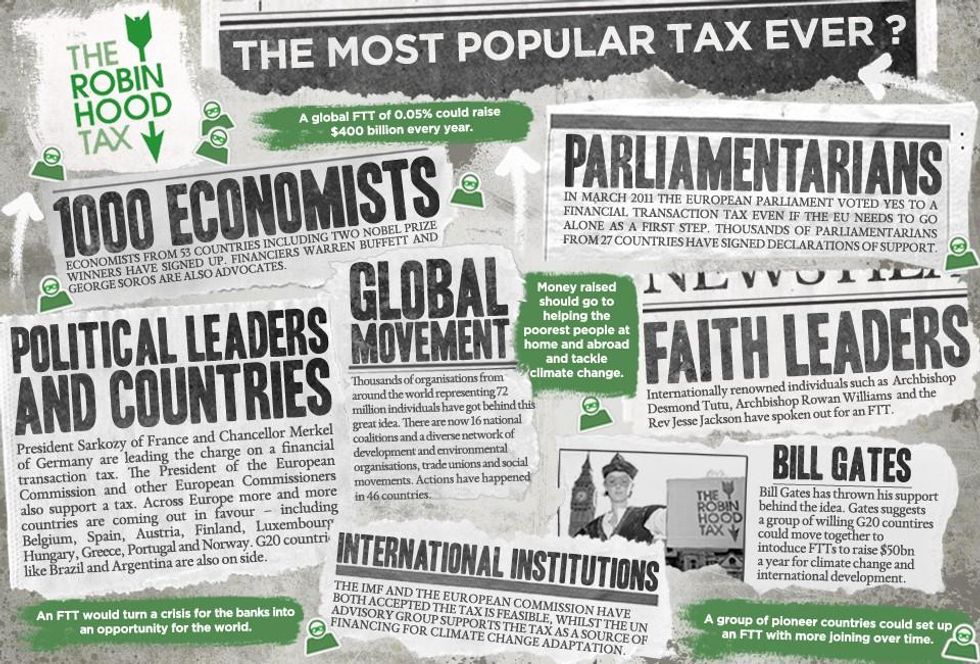EU's Landslide Vote for 'Robin Hood Tax'
Eleven countries in Europe hope to raise billions of Euros through a tiny tax on financial speculation. This week, a major vote in the European parliament brings that plan one step closer to becoming reality.
Under pressure to address a massive deficit, legislators voted overwhelmingly this week in favor of a tax on financial speculation. This really happened, I swear.
OK, it was in Europe, not the United States. But it could happen here--and it should.
The vote in the European Parliament on December 10 was the latest in a series of victories by international campaigners for a tax on trades of stocks, bonds, and derivatives. Often called a "Robin Hood Tax," the goal is to raise massive revenues for urgent needs, such as combating unemployment, global poverty, and climate change.

A financial transaction tax would also discourage the senseless high frequency trading that now dominates our financial markets. Recently, the chief economist of the Commodity Futures Trading Commission (the top U.S. derivatives regulator) found that such trading practices are hurting traditional investors.
In reaction to the Parliamentary vote, David Hillman, of the U.K. Robin Hood Tax campaign, said that the tax "will raise at least 37 billion euros per year for the countries involved whilst reining in the worst excesses of the financial sector."
Nicolas Mombrial, a Brussels-based policy adviser for Oxfam, added that "The European Parliament's overwhelming support reflects the will of Europe's people. In cash-strapped times, an financial transactions tax is a no-brainer that is morally right, technically feasible, and economically sound."
What the European Parliament specifically voted on was whether to give the green light to a coalition of governments that want to pioneer the tax. The countries that have committed to participate are Germany, France, Italy, Spain, Belgium, Austria, Greece, Portugal, Slovakia, Slovenia, and Estonia. The Netherlands is interested, too, but they want to negotiate an exemption for their pension funds.
Not sure Europeans would use this term, but the vote was a slam dunk. Yeas outnumbered nays by a margin of 6-to-1. The next step will be a vote in the European Council, which is likely to happen in early 2013. (On the off chance you're not an expert on European Union governance structures: the Council represents national governments, while E.U. Parliamentarians are elected directly by voters). Then, participating governments will negotiate the details, working off a proposal for a tax of 0.1 percent on stock and bond trades and 0.01 percent on derivatives.
Once revenues start rolling into European coffers, policymakers here are likely to take the idea more seriously. But many U.S. progressives aren't waiting around. A wide range of union, consumer, global health, and environmental groups are pushing for such taxes to be included in the current deficit negotiations. On December 10, National Nurses United, a union representing registered nurses, organized actions in 20 cities to call on Congress to support a Robin Hood Tax.
Taxing financial speculation is just one step we can take towards re-orienting our national priorities in ways that will be good for people and the planet. At the Institute for Policy Studies, we've put together a broad agenda of revenue-raisers and spending cuts that would address our current fiscal challenge while helping to make our economy more equitable, green, and secure.
There's no denying that our current political divisions make it difficult to get anything done in Washington. But we can learn some lessons from Europeans on consensus-building. Their political spectrum is arguably even wider than ours--from Green and Left parties to hard-core conservatives. And yet the Parliament's overwhelming vote in favor of financial transaction taxes is a reminder that such divisions can be overcome.
An Urgent Message From Our Co-Founder
Dear Common Dreams reader, The U.S. is on a fast track to authoritarianism like nothing I've ever seen. Meanwhile, corporate news outlets are utterly capitulating to Trump, twisting their coverage to avoid drawing his ire while lining up to stuff cash in his pockets. That's why I believe that Common Dreams is doing the best and most consequential reporting that we've ever done. Our small but mighty team is a progressive reporting powerhouse, covering the news every day that the corporate media never will. Our mission has always been simple: To inform. To inspire. And to ignite change for the common good. Now here's the key piece that I want all our readers to understand: None of this would be possible without your financial support. That's not just some fundraising cliche. It's the absolute and literal truth. We don't accept corporate advertising and never will. We don't have a paywall because we don't think people should be blocked from critical news based on their ability to pay. Everything we do is funded by the donations of readers like you. Will you donate now to help power the nonprofit, independent reporting of Common Dreams? Thank you for being a vital member of our community. Together, we can keep independent journalism alive when it’s needed most. - Craig Brown, Co-founder |
Under pressure to address a massive deficit, legislators voted overwhelmingly this week in favor of a tax on financial speculation. This really happened, I swear.
OK, it was in Europe, not the United States. But it could happen here--and it should.
The vote in the European Parliament on December 10 was the latest in a series of victories by international campaigners for a tax on trades of stocks, bonds, and derivatives. Often called a "Robin Hood Tax," the goal is to raise massive revenues for urgent needs, such as combating unemployment, global poverty, and climate change.

A financial transaction tax would also discourage the senseless high frequency trading that now dominates our financial markets. Recently, the chief economist of the Commodity Futures Trading Commission (the top U.S. derivatives regulator) found that such trading practices are hurting traditional investors.
In reaction to the Parliamentary vote, David Hillman, of the U.K. Robin Hood Tax campaign, said that the tax "will raise at least 37 billion euros per year for the countries involved whilst reining in the worst excesses of the financial sector."
Nicolas Mombrial, a Brussels-based policy adviser for Oxfam, added that "The European Parliament's overwhelming support reflects the will of Europe's people. In cash-strapped times, an financial transactions tax is a no-brainer that is morally right, technically feasible, and economically sound."
What the European Parliament specifically voted on was whether to give the green light to a coalition of governments that want to pioneer the tax. The countries that have committed to participate are Germany, France, Italy, Spain, Belgium, Austria, Greece, Portugal, Slovakia, Slovenia, and Estonia. The Netherlands is interested, too, but they want to negotiate an exemption for their pension funds.
Not sure Europeans would use this term, but the vote was a slam dunk. Yeas outnumbered nays by a margin of 6-to-1. The next step will be a vote in the European Council, which is likely to happen in early 2013. (On the off chance you're not an expert on European Union governance structures: the Council represents national governments, while E.U. Parliamentarians are elected directly by voters). Then, participating governments will negotiate the details, working off a proposal for a tax of 0.1 percent on stock and bond trades and 0.01 percent on derivatives.
Once revenues start rolling into European coffers, policymakers here are likely to take the idea more seriously. But many U.S. progressives aren't waiting around. A wide range of union, consumer, global health, and environmental groups are pushing for such taxes to be included in the current deficit negotiations. On December 10, National Nurses United, a union representing registered nurses, organized actions in 20 cities to call on Congress to support a Robin Hood Tax.
Taxing financial speculation is just one step we can take towards re-orienting our national priorities in ways that will be good for people and the planet. At the Institute for Policy Studies, we've put together a broad agenda of revenue-raisers and spending cuts that would address our current fiscal challenge while helping to make our economy more equitable, green, and secure.
There's no denying that our current political divisions make it difficult to get anything done in Washington. But we can learn some lessons from Europeans on consensus-building. Their political spectrum is arguably even wider than ours--from Green and Left parties to hard-core conservatives. And yet the Parliament's overwhelming vote in favor of financial transaction taxes is a reminder that such divisions can be overcome.
Under pressure to address a massive deficit, legislators voted overwhelmingly this week in favor of a tax on financial speculation. This really happened, I swear.
OK, it was in Europe, not the United States. But it could happen here--and it should.
The vote in the European Parliament on December 10 was the latest in a series of victories by international campaigners for a tax on trades of stocks, bonds, and derivatives. Often called a "Robin Hood Tax," the goal is to raise massive revenues for urgent needs, such as combating unemployment, global poverty, and climate change.

A financial transaction tax would also discourage the senseless high frequency trading that now dominates our financial markets. Recently, the chief economist of the Commodity Futures Trading Commission (the top U.S. derivatives regulator) found that such trading practices are hurting traditional investors.
In reaction to the Parliamentary vote, David Hillman, of the U.K. Robin Hood Tax campaign, said that the tax "will raise at least 37 billion euros per year for the countries involved whilst reining in the worst excesses of the financial sector."
Nicolas Mombrial, a Brussels-based policy adviser for Oxfam, added that "The European Parliament's overwhelming support reflects the will of Europe's people. In cash-strapped times, an financial transactions tax is a no-brainer that is morally right, technically feasible, and economically sound."
What the European Parliament specifically voted on was whether to give the green light to a coalition of governments that want to pioneer the tax. The countries that have committed to participate are Germany, France, Italy, Spain, Belgium, Austria, Greece, Portugal, Slovakia, Slovenia, and Estonia. The Netherlands is interested, too, but they want to negotiate an exemption for their pension funds.
Not sure Europeans would use this term, but the vote was a slam dunk. Yeas outnumbered nays by a margin of 6-to-1. The next step will be a vote in the European Council, which is likely to happen in early 2013. (On the off chance you're not an expert on European Union governance structures: the Council represents national governments, while E.U. Parliamentarians are elected directly by voters). Then, participating governments will negotiate the details, working off a proposal for a tax of 0.1 percent on stock and bond trades and 0.01 percent on derivatives.
Once revenues start rolling into European coffers, policymakers here are likely to take the idea more seriously. But many U.S. progressives aren't waiting around. A wide range of union, consumer, global health, and environmental groups are pushing for such taxes to be included in the current deficit negotiations. On December 10, National Nurses United, a union representing registered nurses, organized actions in 20 cities to call on Congress to support a Robin Hood Tax.
Taxing financial speculation is just one step we can take towards re-orienting our national priorities in ways that will be good for people and the planet. At the Institute for Policy Studies, we've put together a broad agenda of revenue-raisers and spending cuts that would address our current fiscal challenge while helping to make our economy more equitable, green, and secure.
There's no denying that our current political divisions make it difficult to get anything done in Washington. But we can learn some lessons from Europeans on consensus-building. Their political spectrum is arguably even wider than ours--from Green and Left parties to hard-core conservatives. And yet the Parliament's overwhelming vote in favor of financial transaction taxes is a reminder that such divisions can be overcome.

